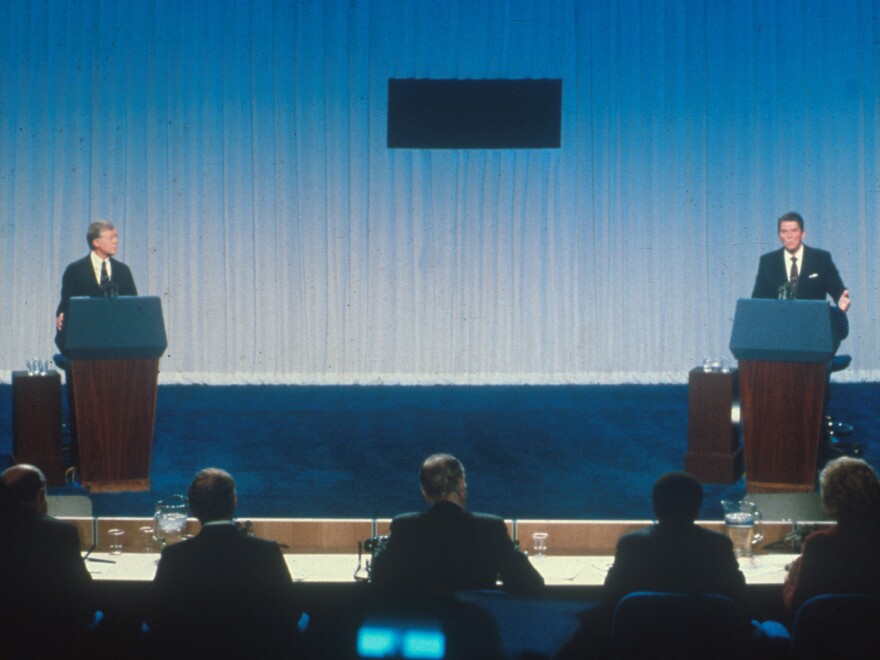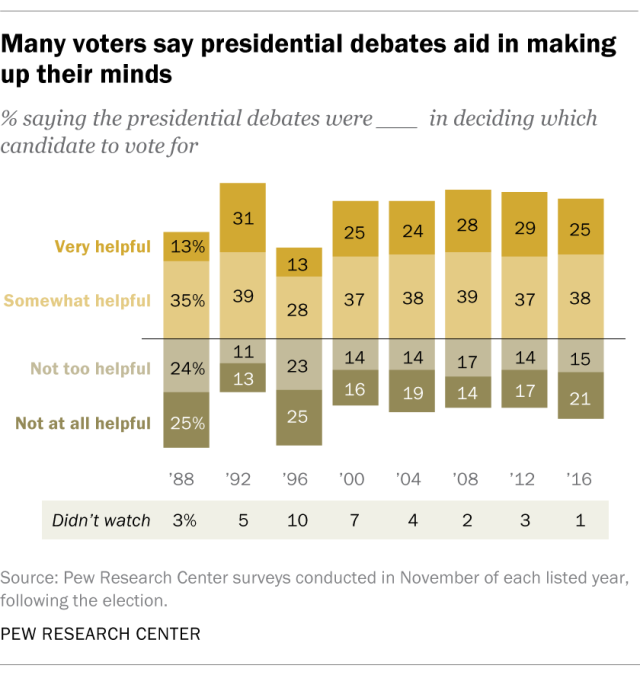Ronald Reagan shot off a snappy retort when asked about his age in 1984. Rick Perry forgot the name of an agency he had vowed to shut down in 2011. And Joe Biden was pushed to snap, "Will you shut up, man!" when Donald Trump wouldn't stop interrupting in 2020.
Zingers, clap backs and gaffes are a mainstay of the political debates that have become an expected part of politics for decades now — as well as, you know, policy discussion.
Yet in this presidential election cycle, Trump has refused to participate in any of the GOP primary debates; former U.N. Ambassador Nikki Haley last week refused to attend any more unless it included Trump or Biden; and then ABC News and CNN had to cancel their planned events.
The political debate seems to have become an endangered species, and there are no assurances we'll see Trump, Biden or Haley share the stage this year.
Here's how we got to this point.
When did political debates become a thing?
There's evidence that Abraham Lincoln and Stephen A. Douglas went toe to toe in 1858 in a series of debates for one of Illinois' two Senate seats. But it wasn't until 1960 that Americans were able to watch two presidential candidates duke it out from the comfort of their own home.
That was the year John F. Kennedy and Richard Nixon suited up and made their way on screen for the first televised presidential debate.
Kennedy came up to the podium looking young and fresh and even had some makeup on. Nixon looked pale and tired.
Before the debate, Nixon was leading in the polls. The day after, Kennedy had a slight edge.
Don Hewitt, who would later go on to create 60 Minutes, was the producer behind the debate and would later reflect on the seismic event: "When that debate was over I realized that we didn't have to wait for an Election Day. We just elected a president."
Since then, there have been more than 40 debates between candidates running for president and vice president, according to the Commission on Presidential Debates. And in that time it hasn't been unheard of for candidates to opt out.
Lyndon B. Johnson, who took office after Kennedy was assassinated, is said to have feared a debate could damage his chances of winning, so he refused to debate Republican nominee Barry Goldwater in 1964. Jimmy Carter sat out the first general election debate because an independent candidate had been invited.
Do political debates influence voters?
It will surprise no one that this question has been studied. A lot. And the slightly unsatisfying answer is ... it's complicated.
Pew Research has been tracking the impact of presidential debates on voters' decisions since 1988. Consistently the research has shown that many voters say the debates aid in choosing which candidate to vote for.
The key word here is aid. Pew's analysis does not show that voters wait on debates in order to make up their minds, with most settling on their preferred candidate at other points in the campaigns.
A meta-analysis published in the journal Communication Monographs in 2010 showed that debates increase the knowledge voters have on certain issues and can alter the way they view a candidate's personality — with the first debate having a greater impact than those that follow.
And a study first published by the National Bureau of Economic Research in 2019 analyzed the influence of debates on more than 60 elections worldwide since 1952. It found that televised debates didn't affect votes, instead positing that the media, political activists and other people were more likely to influence who someone votes for.
Cutting through all the noise here, perhaps the real question is ...
What's the point of debates then — and who is watching?
That also depends on who you ask.
Aaron Kall is the director of debate at the University of Michigan and said debates serve a valuable function.
"The candidates really have to subject themselves and put themselves out in these debates, and they would be invaluable and missed a lot if they totally went away," he said.
He said moderators and audience members have the opportunity to ask questions that haven't already been addressed throughout the campaign. And live debates also provide a glimpse into how a candidate might respond to certain situations.
"You're seeing the candidates process and come up with an answer in real time, how quickly they can think on their feet," Kall said.
"Those are all qualities that I think voters — undecided voters, especially — want to get out of their presidential candidates."
The number of people tuning into these debates tends to fluctuate over time, as the stakes and personalities ebb and flow.

In 1980, roughly 81 million people watched the debate between Jimmy Carter and Ronald Reagan. That record was broken in 2016 when Trump and Hillary Clinton went to the debate stage for the first time — 84 million people watched that night.
The figures dipped in 2020 when only 73.1 million people watched the first presidential debate between Trump and Biden.
Primary debates are barely even in the same league. For the 2023 GOP primary debates — which Trump skipped — viewership was low. The first debate drew 12.8 million viewers, and the second debate dropped to 9.5 million.
The only debate so far in 2024 — between Haley and Florida Gov. Ron DeSantis — drew just shy of 2.6 million viewers. (Although it's worth noting that Trump was doing a live town hall event at the same time, which was airing on Fox News Channel.)
So will there be any more debates this year?
There are two parts to this question.
The first is whether Trump will agree to debate Haley as the final two face off for the Republican nomination. The second is whether the Republican candidate — almost certain to be Trump — will share the stage with Biden in a general election debate.
Currently, there's no word from Haley or Trump on whether they will debate. And given Trump enjoyed dominant wins over Haley in the Iowa caucus and New Hampshire primary, it's hard to see him agreeing to it now.

Looking ahead to the general election, Biden's campaign has been ambiguous on whether he will participate in debates this year. Quentin Fulks, Biden's principal deputy campaign manager, told reporters in December that they are focused on campaigning.
"We will have those conversations," Fulks said. "Our focus is on making sure we continue to build out a campaign and infrastructure that's going to be able to be competitive in 2024."
The Republican National Committee has taken a hard stance on who they want to see moderating debates, also making the likelihood of a Trump-Biden event slightly weaker. In 2022, the RNC voted to withdraw from the Commission on Presidential Debates (CPD).
"The Commission on Presidential Debates is biased and has refused to enact simple and common sense reforms to help ensure fair debates, including hosting debates before voting begins and selecting moderators who have never worked for candidates on the debate stage," the RNC said in a statement.
But Kall said it's possible voters will still see candidates on stage together this year.
"If Trump decides that he wants to debate, the RNC is going to get in line there. And at least as of now, all indications are he wants to debate in the general election," he said.
"[He] doesn't want to be in the primary because he's up a lot and doesn't want to kind of dignify the other candidates that are on stage. But he thinks there'd be a lot of value in debating 81-year-old President Biden; thinks he could maybe commit a gaffe that would be disqualifying."
Copyright 2024 NPR. To see more, visit https://www.npr.org.




